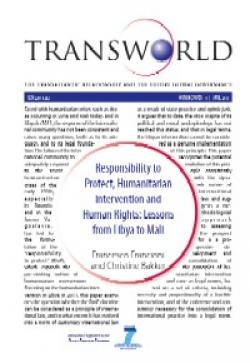Responsibility to Protect, Humanitarian Intervention and Human Rights: Lessons from Libya to Mali
Faced with humanitarian crises such as those occurring in Syria and Mali today, and in Libya in 2011, the response of the international community has not been consistent and raises many questions, both as to its adequacy, and to its legal foundation. The failure of the international community to adequately respond to the severe humanitarian crises of the early 1990s, especially in Rwanda and in the former Yugoslavia, has led to the formulation of the "responsibility to protect" (RtoP), which expands the pre-existing notion of humanitarian intervention. Focusing on the humanitarian intervention in Libya in 2011, this paper examines the question whether the RtoP doctrine can be considered as a principle of international law, and to what extent it has evolved into a norm of customary international law as a result of state practice and opinio juris. It argues that to date, the RtoP, inspite of its political and moral underpinnings has not reached this status, and that in legal terms, the Libyan intervention cannot be considered as a genuine implementation of this principle. This paper recognizes the potential evolution of this principle consistently with the dynamic nature of international law, and suggests a methodological approach to assessing the prospect for a a progressive development and consolidation of the principles of humanitarian intervention and RtoP as legal norms, based on a set of criteria, including necessity and proportionality of a forcible intervention, and of the coherence and consistency necessary for the consolidation of international practice into a legal norm.
Paper produced within the framework of the IAI project Transworld.
-
Details
Roma, Istituto affari internazionali, 2013, 19 p. -
Issue
15
Introduction
1. International Legal Context and Conceptual Evolution of the Responsibility to Protect
1.1. The International Legal Context
1.2. Conceptual Evolution of the Responsibility to Protect
2. The 2011 Intervention in Libya
2.1. Developments Leading to the Adoption of SC Resolution 1973
2.2. Resolution 1973 and the Responsibility to Protect
2.3. Resolution 1973 as Evidence of State Practice on Humanitarian Intervention
3. Assessing the Evolution of Customary Law on Humanitarian Intervention
Conclusions
References



